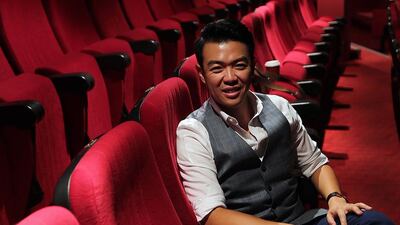The Dubai-based comedian Wonho Chung’s phone calls for takeaway meals always end up with the restaurant attendant hanging up, assuming someone is playing a prank on them.
“I call Zaatar W Zeit or KFC and the guy who answers is Arab, so I give him my order in Arabic,” says Chung, effortlessly switching between English and Arabic to rattle off his usual order as an example.
“Then they ask ‘shu ismak?’ [what’s your name?] and when I say Wonho Chung, they think I’m joking and hang up. It happens so often that I’ve made it part of my stand-up act.”
Chung’s name is not just a moniker used by an Arab entertainer to throw people off – he is of Korean and Vietnamese descent. What is hard to believe is that a non-Arab has built such a successful career in comedy and entertainment by speaking in Arabic.
Chung has had a very busy year. He appears in the Emirati director Ali F Mostafa's From A to B, which will open the Abu Dhabi Film Festival on October 23; he performed at the Miss Lebanon Australia beauty pageant; he has been on a world tour that took him to New York, Toronto, London and Sydney; and he recently released his DVD Wonho Chung in New York City: Live at the Comic Strip, featuring his shows in the Big Apple.
He is back in the UAE for his first Dubai solo performance in two years, which is at Ductac on Tuesday.
Chung – who grew up in Jordan and considers Arabic his first language – has had to explain his multilingual upbringing many times, even before it became his opening joke when he first took the stage with the former Axis of Evil comedy troupe in 2007.
He was discovered at Mall of the Emirates by an OSN TV boss and completed the line-up of the Axis – the group’s name satirises the antiterrorism term coined by the former US president, George W Bush – when the broadcaster decided to screen their show.
“My parents were very forward-thinking even back when we moved to Jordan, not being able to stay in Korea or Vietnam because of the turmoil and poor conditions,” says Chung, whose father is from South Korea and mother is Vietnamese.
“Work opportunities brought us here and my father made sure we were enrolled in Arabic schools to learn the culture and language. He wanted us to live as Arabs, not foreigners, because he thought that was best for our future.”
At home, though, his father insisted they learn English and, as a result, Chung considers Korean and Vietnamese his weakest languages. But his father’s forward-thinking paid off. Chung’s unique selling point is that though he may not look the part, he is every bit an Arab, not just speaking the language but mastering the accent and mannerisms.
Chung, who earned a degree in marketing in Jordan before moving to the UAE in 2004, says pitching his work to a niche market has boosted his popularity.
“Doing English stand-up comedy for me is like being a small fish in a big pond,” he says. “Doing it in Arabic in this part of the world is like being a big fish in a small pond.
“There are thousands of English stand-up shows you can watch on YouTube, but I’m probably one in eight or 10 people that you’ll see doing it in Arabic.”
Chung’s comedy is based around personal experiences, observations and ethnic stereotyping. In Dubai, he will also share some of the funny experiences he had in Korea this year and bring up the hot topic of Arab Idol.
“I pick things up at gatherings or public places such as the airport,” he says. “Again, a lot of topics, such as sex, religion, politics, cussing and bathroom material are off-limits. This makes it halal comedy, which appeals to Arab families.”
Performing for Arabs from different parts of the region means altering the material to suit each particular audience.
“The jokes do change quite a bit,” he says. “I find the Lebanese audience liberal, so you can talk about a lot of things on stage, but at the same time, they are also an experienced audience so are hard to please. Saudis are actually quite loud at shows and crave the entertainment. I’ve noticed Emiratis tend to be a bit more conservative. I think it’s part of their personality – they are proud people.”
To properly connect with the audience, getting the dialect down to a tee is essential.
“Certain words that I use might not be understood in different countries,” says Chung.
“I had an instance where the punchline was ‘Idhikt alaikum’ [I’ve played a joke on you]. When I did it in Kuwait no one laughed. A friend told me later that it was a Jordanian colloquialism and that in Kuwait it was ‘Gussait alaikum’ instead. Now, at least 20 per cent of my act is always in the local dialect.”
When not preparing for his comedy nights, Chung has his hands full with guest appearances, hosting television shows, endorsements and trying his hand at music. He says his lifelong dream has been to break into the music industry. He recorded a song with the United Kingdom-based Lebanese recording artist Ramzi and plans to collaborate with the Arab Idol judge Hassan El Shafei in the future.
Last year, Chung was selected as one of 10 advocates for the Dubai Department of Tourism and Commerce Marketing’s My Dubai campaign.
“Ultimately, I want to make a switch into TV presenting, have my own Arabic talk show, similar to Jimmy Fallon and Ellen DeGeneres,” he says. “The region needs it.”
• Wonho Chung will perform at Ductac, Mall of the Emirates, tomorrow at 8pm. Tickets, priced from Dh150, are available from www.ductac.org
aahmed@thenational.ae

